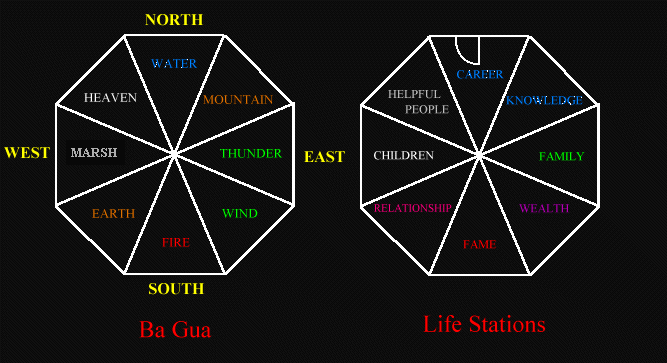History of Feng Shui
Ancient Chinese were very careful in choosing a site to establish a village, a town,
or a capital. A well chosen site could bring prosperity, while a poorly chosen site
famine and war. The duty of selecting a site rest on the shoulders of a learned man.
Experiences passed on from generation to generation establishing what we call today
"Feng Shui" or more correctly "Kan Yu".
Conquering Nature using Science is the philosophy of the West. In the East, people
consider themselves part of the Universe they live in. For this reason, man should
try to be in harmony with Nature. Feng Shui is simply environmental study. If a
Feng Shui practitioner deviates from creating an environment in harmony with Nature,
he is not a genuine Feng Shui Master. In fact, "The Burial Book", an early Feng
Shui book written by Guo Po in about 300 AD emphasized on preserving the
environment. He solemnly told people not to hurt the dragons (mountains) to avoid
disasters. Feng Shui Masters in the Tang Dynasty all taught the principle that a
structure built in harmony with the energy fields of the Universe would enjoy good
Feng Shui. Feng Shui is then the study of how to create a beautifully balanced
environment.
Ancient Chinese Feng Shui Masters were overly selfish. They did not teach their
students all they knew. Many a master kept the secrets until he was seriously ill
and at an old age. In this way a large proportion of valuable knowledge was lost.
In the Tang Dynasty, there were more than 120 schools of Feng Shui but none was in
possession of the true Feng Shui secret. In the Qing Dynasty, one scholar
successfully rediscovered the secrets of Feng Shui and disclosed these great ideas
in his famous "Master Zhenís Space and Time Feng Shui Handbook". This book was
prone to bitter attacks due to jealousy. The contents of this book together with
other genuine Feng Shui concepts are explained in Master Joseph Yuís Feng Shui
Correspondence Course, Advanced Level.
Since the seventies Feng Shui was well received by folks in North America. One
clever man invented a new school of Feng Shui which is extremely easy to
understand. Any house or work place is divided into eight sectors called "life
stations". In the beginning these life stations coincide with the eight sectors of
the Ba Gua.
Using the compass to determine the facing of a building is no easy task. The
extensive use of electrical appliances interferes with earthís magnetic field
making measurements difficult. This school of Feng Shui abolishes the use of the
compass altogether. They claim that the entrance to a building is always the Career
Life Station making Feng Shui so much easier to practice. Some practitioners claim
their Feng Shui to be of Tibetan origin. Others say that such claims are merely
part of a marketing ploy that exploits American ignorance of Asian history. Some are
honest to call the kind of Feng Shui they practice "creative Feng Shui". They are
honest to admit they created a method of placement which is different from genuine
Feng Shui. They also integrate psychology into their practice. All these are more
appropriately called "Pseudo-Feng Shui".

Looking into the future, Feng Shui will be the Science of tomorrow. Though Feng
Shui theories have not yet been proved using any known scientific method, the
principles underlying agree with Quantum Physics and Relativity. It is unfortunate
that people include superstition in their marketing plan and practice. It is my
hope and belief that more and more people will learn this art (if not science) with
seriousness. In the near future, people who use religion and transcendental
nonsense as their marketing humbug will have to vanish.
Glossary
Feng Shui -- Feng means wind and shui means water. Ancient Chinese considered
a site to be fortunate if it was sheltered from the attack of ill winds and untamed
waters. It was considered more fortunate if the wind and water could bring comfort
and fertility to the dwellers.
Kan Yu -- Kan means time factor and Yu means geographical concern. Kan Yu is
the study of a site with reference to the time factor.
|

 Back to the Main Menu.
Back to the Main Menu.